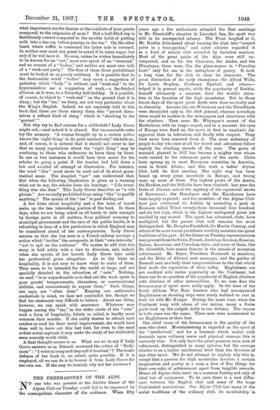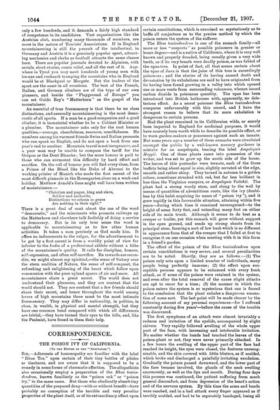THE FREEMASONRY OF THE ALPS.
NO one who was present at the Jubilee dinner of the Alpine Club on Tuesday could fail to be impressed by the cosmopolitan character of the audience. When fifty
years ago a few enthusiasts attended the first meetings in Mr. Hinchclifre chamber lit Lincoln's Inn, the sport Was still in its unrespected infancy. The Press laughed at it, Mr. Ruskin fulminated about turning the Alps into "soaped poles in a bear-garden," and sober citizens regarded it as a kind of suicide club attended by harmless maniacs. Most of the great peaks of the Alps were still un- conquered, and as for the Caucasus, the Andes, and the Himalayas, these were, like the place-names in " Paradise Lost," only for use in the metaphors of poetry. It took a long time for the club to clear its character. The great distinction of its early champions—Sir Alfred Wills, Sir Leslie Stephen, Professor Tyndall, and others— helped it in general repute, while the popularity of Ruskin, himself ultimately a member, drew the world's atten- tion to the beauties of the high mountains. But in those heroic days of the sport great deeds were done modestly and in obscurity. Ascents like the Weisshorn and the Shreckhorn were chronicled only in the eltib journal, whereas nowadays there would be leaders in the newspapers and interviews with the climbers. Then came Mr. Whymper's ascent of the Matterhorn, with its tragic sequel, and in a moment the eyes of Europe were fixed on the sport, at first in emphatic dis- approval, then in toleration, and finally with respect. They have never been removed from it. The most sedentary of people to-day who care at all for travel and adventure follow eagerly the climbing records of the year. The grain of mustard planted in 1857 has become a mighty tree whose roots extend to the uttermost parts of the earth. Clubs have sprung up in most European countries, in America, even in South Africa ; and this week a ladies' Alpine Club held its first meeting. The right' way has been found up every great mountain in Europe, and wrong ways up most of them. The highest peaks of the Andes, the Rockies, and the Selkirks have been climbed; last year the Duke of Abruzzi solved the mystery of the equatorial snows of Ruwenzori ; the Himalayas and the Karakoram have been largely explored ; and two members of the Alpine Club have just celebrated its Jubilee by ascending a peak in Kumaon. called Trisul twenty-three thousand four hundred and six feet high, which is the highest undisputed point yet reached by any mortal. The sport has advanced, clubs have multiplied, but the parent club still remains the most distinguished. Mr. Douglas Freshfield, Sir Martin Conway, and others of its more recent presidents worthily maintain the great traditions of the past. At the dinner on Tuesday representatives were present from the Swiss, French, Austrian, German, Russian, Italian, American, and Canadian clubs, and some of them, like Dr. Giissfeldt, bore names famous in the annals of mountain achievement. Mr. Bryce, President Roosevelt (a member), and the Duke of Abruzzi sent messages, and the guides of Zermatt sent as a body their congratulations to the club which first made the reputation of their valley. Englishmen are not credited with undue popularity on the Continent, but there can be no question of the popularity of English climbers with climbers of other nationalities. To no case does the freemasonry of sport more nobly apply. In the time of the South African War Boer hunters who had accompanied Englishmen on shooting trips were rarely inclined to cast in their lot with Mr. Kruger. During the same time, when the Continent rang with abuse of our nation, many a Swiss guide took up the cudgels hotly in our defence. The reason in both cases was the same. These men were accustomed to see Englishmen at their best.
One chief cause of the freemasonry is the quality of the men who climb. Mountaineering is regarded as the sport of the " intellectual," and for a business which makes such demands upon ordinary nerve and physical courage this is curiously true. Not only have the great pioneers been men of refinement, distinguished in many spheres, but the average climber is on a higher intellectual level than the devotees of any other sport. We do not attempt to explain why this is, except that a passion for high mountains involves a certain imagination and poetry in a man, a love of line things for their own sake, of achievement apart from tangible rewards. Hence all Alpine clubs meet on a common footing not only of ideal but of equipment. To be sure, there i9 a vast differ- ence between the English club and some of the large Continental associations. Our Alpine Club has many of the social traditions of the ordinary club, its membership is
only a few hundreds, and it demands a fairly high standard of competence in its candidates. Vast organisations like the Austrian club, numbering many thousands of members, are more in the nature of Tourists' Associations. If in England mountaineering is still the pursuit of the intellectual, in Germany and Austria it is a genuinely popular sport, attract- ing mechanics and clerks as football attracts the same classes here. There are popular journals devoted to Alpinism, with serials, short stories, comic relief, and all the rest of it. Any- where in Tyrol you may meet hundreds of young men with ice-axe and rucksack tramping the mountains who in England would be at Blackpool or Margate. But the leaders of the sport are the same in all countries. The best of the French, Italian, and German climbers are of the type of our own pioneers, and beside the "Playground of Europe" you can set Guido Rey's " Matterhorn " as the gospel of the mountaineer.
An essential of true freemasonry is that there be no class distinctions, and assuredly mountaineering is the most demo- cratic of all sports. If a man be a good companion and a good climber, it is immaterial whether be be a Cabinet Minister or a plumber. The mountaineer asks only for the root human qualities,—courage, cheerfulness, resource, unselfishness. He numbers among his warmest friends Swiss and Italian peasants who can speak no English, and do not open a book from one year's end to another. Mountain travel is not inexpensive, and a poor man may be unable to compass the tariff for the Grepon or the Dent Blanche ; but the more honour is paid to those who can surmount this difficulty by hard effort and sacrifice. On the roll of honour you will find every class, from a Prince of the Blood like the Duke of Abruzzi to the working printer of Munich who made the first ascent of the most difficult pinnacle in the Rosengarten alone on a week-end holiday. Matthew Arnold's lines might well have been written
of mountaineers:— "Christian and pagan, king and slave, Soldier and anchorite,
Distinctions we esteem so grave Are nothing in their sight."
There is a great deal of cant about the use of the word " democratic," and the miscreants who promote railways up the Matterhorn and elsewhere talk foolishly of doing a service to democracy. But in its only true sense the word is applicable to mountaineering as to few other human activities. It takes a man precisely as God made him. It offers no inducements to the vulgar, for the advertisement to be got by a first ascent is from a worldly point of view far inferior to the kudos of a professional athlete without a tithe of the mountaineer's quality. It calls for discipline, honour, self-repression, and often self-sacrifice. Its rewards are recon- dite, we might almost say spiritual,—the sense of victory over the stern realities of Nature, the sense of self-conquest, the refreshing and enlightening of the heart which follow upon communion with the pure upland spaces of air and snow. All mountaineers share a great secret. The world does not understand their pleasures, and they are content that the World should not. They are content that a few friends should share their secret, and hence throughout the world among lovers of high mountains there must be the most intimate freemasonry. They may differ in nationality, in politics, in class, in wealth, in physical and mental strength, but they have one common bond compared with which all differences are trivial,—they have turned their eyes to the hills, and, like the Psalmist, have found in them their help.















































 Previous page
Previous page